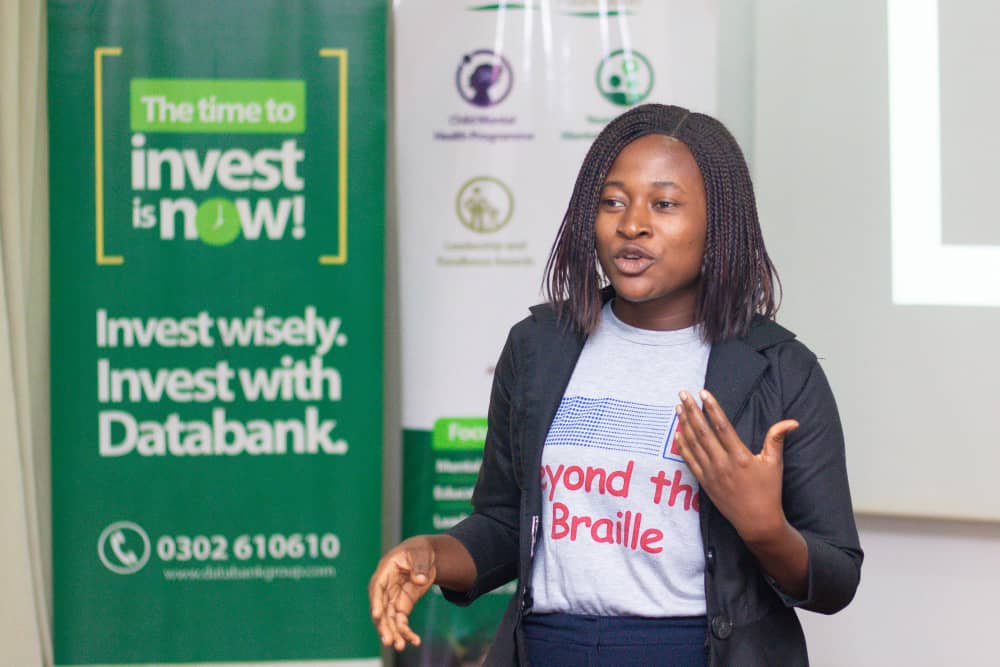Jennifer De-Graft Ninson: Supporting visually impaired youth with digital skills

In the hands of young social innovators, technology can be used to build more inclusive communities and countries. Jennifer De-Graft Ninson’s initiative, Beyond the Braille, is an example of this in action.
Beyond the Braille trains visually impaired university students in basic computer skills. Jennifer first identified the need for a solution like this in 2017 when completing her first year of studies at the University of Education, Winneba, in Ghana’s Central Region.
Two of her friends were visually impaired, and they had very different approaches to studying. One friend, Emmanuel, would record the audio of his lectures, play back the recording, and write his notes in braille. It was a time consuming process with a lot of expenses.
Mr. Coleman, her second friend, was a master’s student who used a laptop in class. “Analyzing the way his studies were going compared to [Emmanuel] who was struggling, I came to the conclusion that it is better to use a computer,” explains Jennifer.
She formally launched Beyond the Braille a year later after a convening of the MasterCard Foundation Scholars at Ashesi University in Ghana, and after receiving coaching from Derick Omari, a young innovator who had a similar project.
Today, the initiative pairs university student volunteers with a visually impaired peer for one-on-one training. Topics covered include basic computer navigation, the Microsoft Suite, and using the internet and online learning platforms.
In addition to supporting their studies, Jennifer hopes these new tech skills will help students find a job after graduation. “There is already a high level of inequality against persons with disabilities,” she explains. “Some of them complete school and may not get good jobs or even employment because of their disability.”
With the high demand for digital skills, ensuring students with visual impairments have tech experience is a way to eliminate just one of the many barriers they may face in finding work. In an effort to expand her impact, Jennifer has also founded the Organization for Inclusion and Empowerment (OFIE), which uses advocacy, mentorship, and education to support other differently abled youth.
#DOTYouth Street Team and life after the pandemic
COVID-19 had a significant impact on Beyond the Braille’s training activities. Jennifer’s university was on break from March 2020 until January 2021, meaning it was not possible for the initiative to continue its training.
Still, Jennifer kept busy, registering the organization, running disability awareness campaigns, and establishing relationships with high school heads to promote OFIE’s mentorship program. She also launched a menstrual hygiene project to mark International Day of the Girl Child
Now that classes have resumed, she and her team of volunteers are reassessing what new help students may need. They are also seeing if the 20 youth they had trained were able to practice what they had learned while at home—though Jennifer says it is unlikely as about 90% of Beyond the Braille’s training is done using the team’s personal computers. The financial support provided by the #DOTYouth Street Team is Jennifer’s first financial step towards investing in a training centre furnished with computers.
With multiple projects on-the-go and her final year of university studies underway, Jennifer admits that prioritizing what to work on can be challenging. That is why she is happy to have been paired with Jennifer Agyeman, a fellow Ghanaian and a coach through the #DOTYouth Street Team.
““The first time I spoke with my coach it was exciting because I could connect with her level of energy,” says Jennifer. “When I get to talk about my ideas it helps me sharpen what needs to be done, and my coach has a listening ear and excellent suggestions each time we communicate. #DOTYouth Street Team has given me a better way of visualizing my plans and working towards my goals.”
